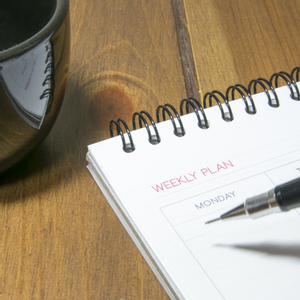Jill Katz, One to Zen Organizing
December 1, 2020

Decisions and Adulthood
When I was a kid I couldn’t wait to become an adult. I would have dessert for breakfast and stay up until midnight and watch all the TV shows I wanted. I had it all planned out. Oh, and of course I figured I would know all the answers to all the important questions because adults know everything. Of course!
OK, so being an adult was not exactly how I thought it would be. But the most startling revelation was the sheer number of decisions I needed to make every day. What should I cook for dinner? Should I say “Yes” to this thing or that thing? Which type of cell phone should I purchase? Can we afford X? The decisions were endless. Why did they never mention this in school?
As an organizer, I see the results of decision fatigue--Clutter. Yes, let’s repeat that: Clutter is the result of unmade decisions.
Clutter is the result of unmade decisions.
Tips for Making Decisions
Here are my first four tips to help you stave off decision fatigue so you can get control of your physical and mental clutter:
1. Decision making is maintenance

We make daily decisions to keep up with our clutter. Michelle Vig, a fellow Professional Organizer, and owner of Neat Little Nest, identifies three types of clutter in her book,"The Holistic Guide to Decluttering: Organize and Transform Your Space, Time and Mind. Space clutter is physical clutter such as clothes on the floor. Time clutter is the result of stuffing too many appointments in a day. Mind clutter is an overabundance of thoughts rushing through our brain, many of them negative. These 3 types of clutter will build up if we do not make daily decisions about what we store in our space, time, and mind. Allowing all items into your home, saying “Yes” to every invitation, and holding on to every thought will lead to an onslaught of clutter. It’s up to you to make decisions that reduce this clutter before you become buried in it.
2. Making a decision is the equivalent of working a muscle

You don’t start your exercise routine by picking up 20 lb weights. You start with a warm-up, some light weights and then ease your way into the heavier ones. Use the same technique for making decisions. Start with a decision that is easy for you and work your way up to the more difficult ones. For me, an easy decision is choosing what to wear for the day or settling on a menu for dinner. A more difficult decision might be what color to paint my bedroom. Your notions of “easy” or “difficult” might differ from mine.
3. Routines

Setting routines is the ultimate strategy for preventing decision fatigue. For example, if I wake up every morning at the same time, carry out the same workout routine, and eat the same breakfast every day then I save myself from making 3 decisions every day. Think about what positive routines you can build into your day or week and practice them until they become a habit.
4. Mantras

Mantras are a great way to throw out mind clutter (negative or unhelpful thoughts) so you can apply your renewed energy toward making good decisions. I love mantras so much that I wrote a wholeblog post about them! The next time you feel anxious about attacking any sort of clutter, think of a good mantra (“I can do this,” “I am strong,” “I am safe”), sit down for a few minutes, close your eyes and say the mantra over and over while practicing slow, deep breathing. When you open your eyes, you will be ready to face your clutter with a feeling of clarity and calm. It really works!
To Be Continued...
Stay tuned for my next blog post featuring 5 more tips for making decisions and preventing clutter.
For more information contact:
Jill Katz One to Zen Organizing